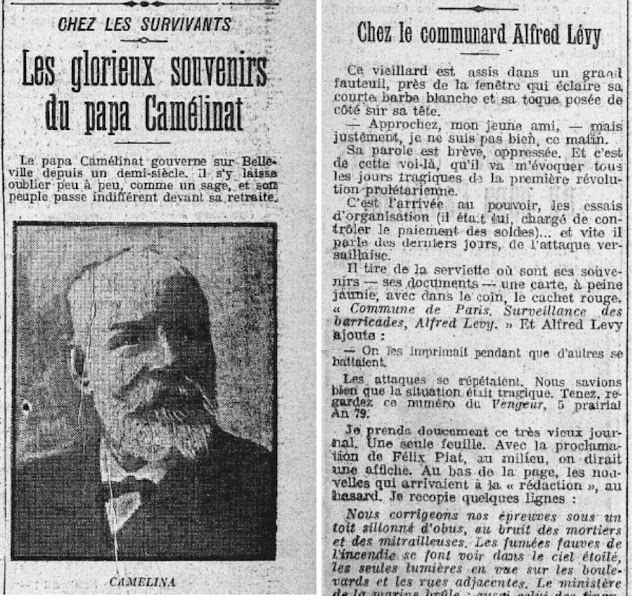100 years ago this week: Week 11
This week in 2021, France is commemorating the 150th anniversary of the Paris Commune. How did the country and city commemorate the 50th anniversary in March 1921? If the subject was still politically charged and the date ignored by most papers, on a human level it was fascinating. 100 years ago, surviving witnesses could still be found and interviewed!
Read on to meet some of the characters.
If it is controversial today, we can imagine how difficult the subject must have been to mention 100 years ago when people who had experienced the conflicts, destruction and massacres were still alive. How did the press feature this anniversary in 1921? As far as I can see, by completely ignoring the date. All but one newspaper I should say. L’Humanité (cutting above), a Socialist newspaper which had declared its support for revolutionary Communism in 1920, published many articles across this week.
The date being commemorated is March 18, 1871, the day the Paris Commune took over government buildings in the city and forced the government to flee to Versailles. France had surrendered to the Prussian army in January after a terrible three-month siege of Paris, but the Parisians themselves refused to give up. If the French government wasn’t going to represent and defend them, they would form their own government and defend themselves.
Eyewitness accounts
50 years later, L’Humanité tells us, all marches and demonstrations commemorating this date were banned by the French government. A meeting though was still organised in Saint-Denis, bringing together communists, socialists and unions. Alongside a review of Trotsky’s most recent publication, mentioning the Commune, and a reminder to readers that Napoleon had been one of the key symbols the Communards had fought against (notably the toppled statue in Place Vendome), the paper rather touchingly features two eyewitness accounts from March 18, 1871.
Papa Camalinat and Alfred Lévy are both ‘viellards’, old men reminiscing from comfortable chairs in their apartments. Camalinat remembers everything, including the odours of the “fighting on the barricades, the sweat of the proletarians charging on the cannons, the blood of the victims". Lévy tells us that he was not afraid to die because, as far as the government forces were aware, he was already dead! Another man had borrowed his pass to go across the barricades, and had been executed shortly afterwards.
The Commune only lasted two months, ending in chaos, destruction and massacres during the ‘semaine sanglante’ (I wonder if I will find more reporting on this period in the newspapers of 1921…). "We knew all the time that the situation was destined to be tragic" recalls Lévy.
Communards and Communism
Adolphe Thiers’ government had won, but scars were left that have never healed. 50 years after the Commune, those scars were still raw, and many feared they could open again. In 1921, rather than on any impact the Commune may have had at home, the French state and mainstream media was more concerned with its influence elsewhere in Europe. The Russian revolution had taken place only four years earlier, and Lenin had declared the Paris Commune to be its forerunner. In the Trotsky book review from L'Humanité mentioned previously, a salient line is highlighted; “we venerate the memory of the Commune”.
If the 50th anniversary of the Paris Commune wasn't mentioned in the other papers, another event was front-page news on that same day. A group of 10 communist activists were aquitted of plotting against the French state, and were freed after a year of pre-trial custody. The trumped up and abusive charges were a clear demonstration of the fears of further uprisings that were nurtured by the ruling class.
There were no barricades in the streets of Paris in 1921, but the lines drawn in French society were still in place. When looking back on past events, what wasn't featured in the press is as important as what was published. The silence surrounding the 50th anniversary of the Paris Commune was extremely significant.

















4 comments:
If you had a like button, I’d like this :)
Tres interessant, merci!
I've occasionally wondered if the determination of De Gaulle in August 1944 to ensure that his troops got to Paris as quickly as possible after the uprising started was in some part based on concern that the Communist influence in the leadership of the uprising might lead to a revived attempt at a Commune.
Autolycus: I think you're absolutely right. Before the General Leclerc arrived in Paris, Rol Tanguy had already lead the Parisians to build hundreds of barricades across the city!
Post a Comment